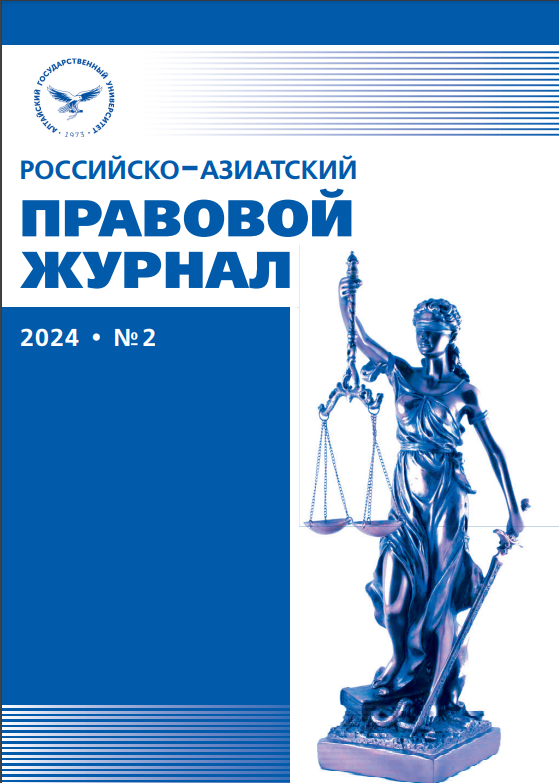PARTY AUTONOMY AND DETERMINING THE LAW TO BE APPLIED TO DETERMINING THE LEGAL STATUS OF PERSONS
Abstract
In this article, the author examines the possibilities of using party autonomy in determining the law tobe applied to determine the legal status of persons. The author concludes, today in Russian conflict of lawlegislation party autonomy only in exceptional cases finds a place when determining the law to be appliedto determine the legal status of individuals and legal entities, which is largely due to the negative attitudeof the legislator to transactions aimed at limiting the passive legal capacity and active legal capacity. On theother hand, expanding the passive legal capacity or active legal capacity of persons due to a foreign law doesnot always find consensus among domestic law enforcement officials.
Downloads
References
Вознесенская Н.Н. Юридические лица в международном частном праве России и ЕС // Труды Института государства и права Российской академии наук. 2017. Т. 12. №2. С. 109–144.
Кадышева О.В. Национальность юридического лица в международном частном праве : дисс. … канд. юрид. наук: 12.00.03. М., 2002. 168 с.
Комментарий к Гражданскому кодексу Российской Федерации части третьей (постатейный) / отв. ред. Н.И. Марышева, К.Б. Ярошенко. М. : Контракт, 2014 // СПС Гарант.
Комментарий к разделу VI «Международное частное право» части третьей Гражданского кодекса Российской Федерации (постатейный) / отв. ред. И.С. Зыкин, А.В. Асосков, А.Н. Жильцов. М. : Статут, 2021. 665 с.
Козлова Н.В. Правосубъектность юридического лица. М. : Статут, 2005. 476 с.
Мартенс Ф.Ф. Современное международное право цивилизованных народов. Т. 2. СПб. : Типография Министерства путей сообщения, 1883. 563 с.
Международное частное право : учебник. В 2т. Т. 1: Общая часть / отв. ред. С.Н. Лебедев, Е.В. Кабатова. М. : Статут, 2011. 400 с.
Международное частное право : сборник национальных кодификаций / сост. и ред. В. Плеханов. М., 2021. 1112 с.
Мыскин А.В. К вопросу об ограничении правоспособности физических лиц в гражданском праве // Два очерка из области цивилистики. М., 2015 // СПС «КонсультантПлюс».
Пояснительная записка к проекту федерального закона «О внесении изменений в части первую, вторую, третью и четвертую Гражданского кодекса Российской Федерации, а также в отдельные законодательные акты Российской Федерации». URL: https://sozd.duma.gov.ru/bill/171311–6 (дата обращения: 27.05.2024).
Суслов А.А. Отказ от правоспособности в гражданском праве России // Пролог: журнал о праве. 2017. №1. URL: https://cyberleninka.ru/article/n/otkaz-ot-pravosposobnosti-v-grazhdanskom-praverossii (дата обращения: 27.05.2024).
Тригубович Н.В. Автономия воли в международном частном праве : дисс. … канд. юрид. наук: 12.00.03. Саратов, 1999. 161 с.
Rühl G. Party Autonomy in the Private International Law of Contracts: Transatlantic Convergence and Economic Efficiency. URL: https://core.ac.uk/download/pdf/232618486.pdf (дата обращения: 27.05.2024).
Copyright (c) 2024 Ю.В. Блинова

This work is licensed under a Creative Commons Attribution 4.0 International License.
Russian-Asian Law Journal is a golden publisher, as we allow self-archiving, but most importantly we are fully transparent about your rights.
Authors may present and discuss their findings ahead of publication: at scientific conferences, on preprint servers, in public databases, and in blogs, wikis, tweets, and other informal communication channels.
Russian-Asian Law Journal allows authors to deposit manuscripts (currently under review or those for intended submission) in non-commercial, pre-print servers such as ArXiv.
Authors who publish with this journal agree to the following terms:
- Authors retain copyright and grant the journal right of first publication with the work simultaneously licensed under a Creative Commons Attribution License that allows others to share the work with an acknowledgement of the work's authorship and initial publication in this journal.
- Authors are able to enter into separate, additional contractual arrangements for the non-exclusive distribution of the journal's published version of the work (e.g., post it to an institutional repository or publish it in a book), with an acknowledgement of its initial publication in this journal.
- Authors are permitted and encouraged to post their work online (e.g., in institutional repositories or on their website) prior to and during the submission process, as it can lead to productive exchanges, as well as earlier and greater citation of published work (See The Effect of Open Access).








